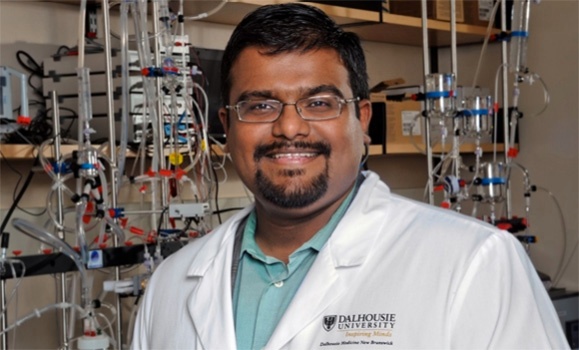Dr. Thomas Pulinilkunnil, assistant professor in π˚Ω¥ ”∆µ Medical School‚Äôs Department of Biochemistry and Molecular Biology, recently received a national Canadian Diabetes Association (CDA) grant ‚Äì the first one ever awarded in New Brunswick.
The $300,000 investment into Dr. Pulinilkunnil’s work will help his team continue fundamental research into diabetes triggered by obesity.
“When people are obese and also have diabetes, their heart cells become sick,” says Dr. Pulinilkunnil.
“Like every living thing, heart cells dispose and recycle waste. But when in an obese and diabetic environment, they can’t keep up with the garbage removal and recycling process. This leads to heart failure.”
New drug target discovered
In his π˚Ω¥ ”∆µ Medicine New Brunswick laboratory, Dr. Pulinilkunnil discovered a protein that helps heart cells get rid of waste more easily.
“Like a housekeeper hired to clean up the mess, we’ve discovered a new drug target that helps heart cells to efficiently clean up junk that surrounds them,” explains Dr. Pulinilkunnil.
“Using the CDA funds, my research team will begin screening for small molecules that act on this target, which can then can be commercially developed by pharmaceutical companies.”
To advance fundamental understanding of diabetic heart disease and the drug target they identified, the team is currently doing studies in human heart samples.
“Our goal is to improve the quality of life for individuals suffering from obesity-related diabetic heart complications,” says Dr. Pulinilkunnil.
He’s also hoping to attract more people to his Saint John lab.
“With our research ramping up to the next phase, the aim is to recruit and train more highly-qualified students, postdoctoral fellows, and research technicians and associates to New Brunswick,” says Dr. Pulinilkunnil. “We’ve got a good cardio-metabolic research team here, but we’re always looking for more trainees and collaborators.”

